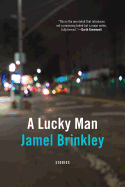
In his beautifully wrought debut collection, A Lucky Man, Jamel Brinkley examines the ceremonies and consequences of prescribed masculinities, family, trauma and the inherited "[approaches] to life's deceptions."
Whether they're adopting protective personas, seeking questionable comforts, clinging to expectations or subduing desires, the men and boys in A Lucky Man all find themselves in moments of transition, contending with "freedom [as] a wilderness." What is wild is a break from convention, and Brinkley masterfully integrates the harbinger of such breaks--the trickster--into his stories. In "No More Than a Bubble" and "J'ouvert, 1996," Brinkley builds heady and chaotic revelries as opportunities to shake characters loose from what binds them. In "Everything That the Mouth Eats," a story after James Baldwin's "Sonny's Blues," he uses the rhythms and logic of capoeira so two brothers can "see the world upside down" and find a bit of liberation from unspeakable pain. Throughout the collection, Brinkley poses subtle, challenging questions. As with capoeira, he often feints one way, only to slide another way. How he complicates love, anger, shame and forgiveness with such serious and tender play is astonishing.
Many of the characters carry tense fists and barely concealed hurt. Yet, they do not snap so much as they are stretched to accommodate, however imperfectly, the possibility of transformation. Brinkley synthesizes empathy and accountability with controlled, sharp lyricism and a big steady heart, declaring all the while that "none of us deserves to be loved... so all of us should be." --Shannon Hanks-Mackey, freelance editor and managing editor at the Black Scholar

